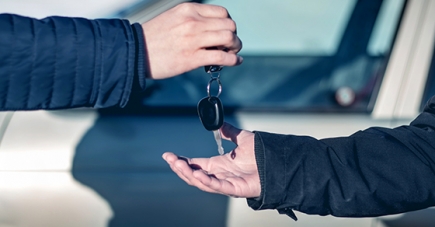Donating your vehicle to charity may not be a taxwise decision
You’ve probably seen or heard ads urging you to donate your car to charity. “Make a difference and receive tax savings,” one organization states. But donating a vehicle may not result in a big tax deduction — or any deduction at all.
Trade in, sell or donate?
Let’s say you’re buying a new car and want to get rid of your old one. Among your options are trading in the vehicle to the dealer, selling it yourself or donating it to charity.
If you donate, the tax deduction depends on whether you itemize and what the charity does with the vehicle. For cars worth more than $500, the deduction is the amount for which the charity actually sells the car, if it sells without materially improving it. (This limit includes vans, trucks, boats and airplanes.)
Because many charities wind up selling the cars they receive, your donation will probably be limited to the sale price. Furthermore, these sales are often at auction, or even salvage, and typically result in sales below the Kelley Blue Book® value. To further complicate matters, you won’t know the amount of your deduction until the charity sells the car and reports the sale proceeds to you.
If the charity uses the car in its operations or materially improves it before selling, your deduction will be based on the car’s fair market value at the time of the donation. In that case, fair market value is usually set according to the Blue Book listings.
In these cases, the IRS will accept the Blue Book value or another established used car pricing guide for a car that’s the same make, model, and year, sold in the same area and in the same condition, as the car you donated. In some cases, this value may exceed the amount you could get on a sale.
However, if the car is in poor condition, needs substantial repairs or is unsafe to drive, and the pricing guide only lists prices for cars in average or better condition, the guide won’t set the car’s value for tax purposes. Instead, you must establish the car’s market value by any reasonable method. Many used car guides show how to adjust value for items such as accessories or mileage.
You must itemize
In any case, you must itemize your deductions to get the tax benefit. You can’t take a deduction for a car donation if you take the standard deduction. Under the Tax Cuts and Jobs Act, fewer people are itemizing because the law significantly increased the standard deduction amounts. So even if you donate a car to charity, you may not get any tax benefit, because you don’t have enough itemized deductions.
If you do donate a vehicle and itemize, be careful to substantiate your deduction. Make sure the charity qualifies for tax deductions. If it sells the car, you’ll need a written acknowledgment from the organization with your name, tax ID number, vehicle ID number, gross proceeds of sale and other information. The charity should provide you with this acknowledgment within 30 days of the sale.
If, instead, the charity uses (or materially improves) the car, the acknowledgment needs to certify the intended use (or improvement), along with other information. This acknowledgment should be provided within 30 days of the donation.
Consider all factors
Of course, a tax deduction isn’t the only reason for donating a vehicle to charity. You may want to support a worthwhile organization. Or you may like the convenience of having a charity pick up a car at your home on short notice. But if you’re donating in order to claim a tax deduction, make sure you understand all the ramifications. Contact us if you have questions.
© 2019
Estate planning for single parents requires special considerations
Here’s a fast fact: The percentage of U.S. children who live with an unmarried parent has jumped from 13% in 1968 to 32% in 2017, according to Pew Research Center’s most recent poll.
While estate planning for single parents is similar to estate planning for families with two parents, when only one parent is involved, certain aspects demand your special attention.
5 questions to ask
Of course, parents want to provide for their children’s care and financial needs after they’re gone. If you’re a single parent, here are five questions you should ask:
1. Have I selected an appropriate guardian? If the other parent is unavailable to take custody of your children should you become incapacitated or unexpectedly die, your estate plan must designate a suitable, willing guardian to care for them.
2. What happens if I remarry? Will you need to provide for your new spouse as well as your children? Where will you get the resources to provide for your new spouse? What if you placed your life insurance policy in an irrevocable trust for your kids to avoid estate taxes on the proceeds? Further complications can arise if you and your new spouse have children together or if your spouse has children from a previous marriage.
3. What if I become incapacitated? As a single parent, it’s particularly important to include in your estate plan a living will, advance directive or health care power of attorney to specify your health care preferences in the event you become incapacitated and to designate someone to make medical decisions on your behalf. You should also have a revocable living trust or durable power of attorney that provides for the management of your finances in the event you’re unable to do so.
4. Should I establish a trust for my children? Trust planning is one of the most effective ways to provide for your children. Trust assets are managed by one or more qualified, trusted individuals or corporate trustees. You specify when and under what circumstances funds should be distributed to your kids. A trust is particularly important if you have minor children. Without one, your assets may come under the control of your former spouse or a court-appointed administrator.
5. Am I adequately insured? With only one income to depend on, plan carefully to ensure that you can provide for your retirement as well as your children’s financial security. Life insurance can be an effective way to augment your estate. You should also consider disability insurance. Unlike many married couples, single parents don’t have a “backup” income in the event they can no longer work.
Review your estate plan
If you’ve recently become a single parent, it’s critical to review your estate plan. We’d be pleased to help you make any necessary revisions.
© 2019

Walls & Associates is a certified public accounting firm serving the needs of businesses and individuals in the tri-state area of West Virginia, Kentucky, and Ohio. We are confident that regardless of size, we can fulfill your financial and tax accounting needs – whether it is a simple individual tax return, a consolidated multi-state corporate tax return, a nonprofit tax return, or general bookkeeping.
CONTACT US
-
Milton Office Location:
Phone: 304-390-5971
1025 N. Main Street
Milton, WV 25541 -
Hamlin Office Location:
Phone: 304-824-3880
19 3rd Street
Hamlin, WV 25523
WORKING HOURS
| Monday | 8:30 am - 5:00 pm |
| Tuesday | 8:30 am - 5:00 pm |
| Wednesday | 8:30 am - 5:00 pm |
| Thursday | 8:30 am - 5:00 pm |
| Friday | 8:30 am - 5:00 pm |
| Saturday | Closed |
| Sunday | Closed |

